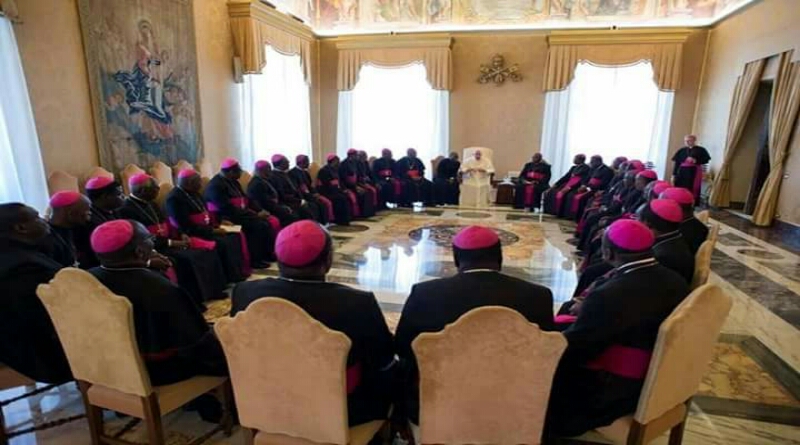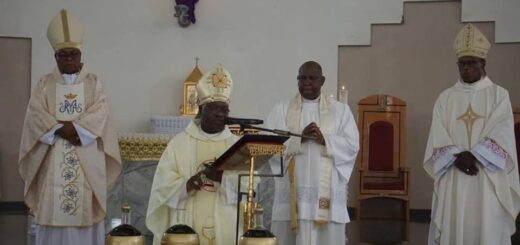In His Love and Providence God does not abandon us
by ARCH BISHOP · June 30, 2024
THIRTEENTH SUNDAY IN ORDINARY TIME YEAR B; 30TH JUNE, 2024 at Our Lady Queen of Martyrs, Sabon Lugbe. Homily by Archbishop I.A.Kaigama.
Readings: Wisdom 1:13-15; 2:23-24; 2 Cor. 8:7.9.13-15; Mark 5:12-43
In His Love and Providence God does not abandon us.
I am very happy to be with you today parishioners of Our Lady Queen of Martyrs, Sabon Lugbe. It is your turn during this special visit of your Archbishop to you to celebrate and promote our pastoral communion and spiritual solidarity in the Archdiocese of Abuja. As I go around every Sunday, especially to the suburbs, I meet with people who, even though devoid of the luxury of basic material things, have a dynamic faith; they participate enthusiastically in the liturgy; they suffer economic, social, and other effects of bad governance but are still smiling, still hopeful, still trusting that the Lord is their strength, rock, refuge, hope, and salvation.
Your parish Church has a challenging name, dedicated to our Blessed Mother as well as to the Martyrs. Martyrs are people who sacrifice their lives for the faith. In Nigeria, we know people who have died for their faith such as the seminarian of Kaduna major seminary professing his faith and challenging his kidnappers to believe in Jesus; Miss Vivian in Benin city, resisting being bodily desecrated by murderers; those murdered in church in Ondo at Mass; those killed in St. Finbarr, Rayfield, Jos, at Mass; those killed in Suleja Niger State after Christmas Mass; the many recently killed in Bokkos, Mangu, etc.
Your courage to remain strong and to stay with Jesus is commendable. Today as we confer the sacrament of Confirmation on over 200 candidates, your parish priest Rev. Fr. John Adimula, CSSP, has assured us that they qualify to be called “soldiers of Christ,” not however to fight with murderous weapons but with love and prayer. We are anointing them with the Holy Chrism so that the Holy Spirit will strengthen them so that nothing, as Romans 8:35 says, will separate them from the love of Christ; not tribulation, or anguish or famine or nakedness or peril, or persecution or the sword.
While not all may experience the “red martyrdom” by torture or violent death, like St. Peter and St. Paul whose feast we celebrated yesterday, we are called to be aware that as good Christians we may experience “white martyrdom” i.e. persecution, denials of our fundamental rights, discrimination, being terrorized and brutalized for simply being Christians and denied our due. We are indeed called to white martyrdom; by doing good always even if we have to suffer; sacrificing for the comfort of others; suffering because our rights are denied, our jobs are given to others just because our names sound Christian, and denied land for worship because of who we are. John 16: 2 says, “The hour is coming when everyone who puts you to death will consider that he is offering an excellent service to God.” Be strong, defend the cross, and carry the cross, which is why we begin our prayers with the sign of the cross. In the cross lies our salvation.
The readings of today invite us to reflect on the profound truth that our God is the God of life, who brings healing, restoration, and renewal to all who seek Him. In John 3 Jn 1: 2 we read, “Beloved, I wish above all things that you may prosper and be in health, even as your soul prospers” Yes, this is the desire of God for us.
However, as we look around our world today, we see various threats to human life and dignity. From the tragedy of abortion to the injustices of war and poverty, from the indifference to the plight of refugees to the exploitation of the vulnerable. Our faith calls us to confront these challenges with courage and compassion. We are called to uphold the dignity of every person, no matter their circumstances or background.
The first reading today emphasizes that God created all things good and that death entered the world because of Satan, but God’s loving plan for us remains supreme, whether we are dead or alive.
This Sunday, the evangelist Mark presents us with a tale of two miraculous healings that Jesus performed in favour of two women: the daughter of Jairus, one of the leaders of the synagogue; and a woman who suffered from haemorrhage.
At the news that the daughter of Jairus was dead, Jesus says to the leader of the synagogue, “Do not be afraid, but have faith!” Jesus takes him with Him to where the girl was, and exclaims: “Little girl, I say to you: Get up!”. And she got up and walked.
Jesus tells us today too, “Do not be afraid, have faith.” What we should ask for is an ever-stronger and deeper faith, solid and unshakable faith in Jesus, not faith in miracles and prosperity. When we have faith, all things are possible. Faith can move mountains.
Many of our new generation pastors worry stiff that they may lose their tithe-paying and donation-making members, and so, are ready to manufacture all sorts of miracles that even to the undiscerning, are only taking people for a ride. What Jesus expects of all of us is not the number of miracles worked for us by “super miracle-working pastors,” but to be attentive to human suffering and He urges us to do all that is credible to help the sick to carry their crosses, and in particular physicians, health care professionals and those who provide pastoral care in nursing homes.
Jesus calls you and me to bring peace and hope to the suffering. We in turn call on our leaders to come to the rescue of the poor in the country, to bring justice, peace, and employment; to bring back our country to life. We cannot leave the sick in the hands of charlatans who pretend to be offering divine succour to them when in actual fact, they are exploiting their ignorance. Certainly, God can hear our prayer to heal the sick, but not the type that multitudes are brainwashed to believe that such can only be carried out only in a specific popular church, at a designated time, and at the whim and caprice of a particular preacher or pastor.
Dear brothers and sisters, today also, we are presented with a powerful reflection on the Christian response to the needs of others. St. Paul emphasizes the principle of solidarity—the idea that we are all interconnected as members of the Body of Christ. When one member suffers, we all suffer; when one rejoices, we all rejoice. This interconnectedness calls us to reach out to those who are suffering and to share generously from our own blessings, whether they be material resources, time, talents, or compassion. Here we have worshipping with us, Fr. Cislo Waldemar and his two colleagues from Poland. They represent Aid to the Church in Need (ACN) with their headquarters in Germany. They take up collections from their people and channel them to Lebanon, Ukraine, Nigeria, and many parts of the world.
We must all have a role to play in God’s plan towards others. Hence, Paul tells us today: “You always have the most of everything…so we expect you to put the most into this work of mercy too.” So, while Christ seeks our welfare every day, we too must continually seek the welfare of others.
Currently, people are talking of creating regional governments. If we carry this attitude of dishonesty, bribery and self-centredness with us, we can have as many regions as we like, we will only multiply corruption, poverty and injustice.
The first reading reminds us that God did not create death. But when you allow doctors and nurses to go on strike and people die and you attribute it to God’s will; when you allow roads to be badly built and accidents occur and we blame it on God; when you divert resources to fight crime through corruption and insecurity increase and people are killed, maimed, kidnapped, and their means of livelihood destroyed and you say it is Gods will, please note that God gave us the free will to choose evil or good but we often choose evil, corruption and injustice and turn round to blame God!
Today, there are those who are marginalized, forgotten, or overlooked. Just as the woman in the Gospel with the flow of blood suffered great misery for twelve years, there seemed no escape for her until she met Jesus.
We too might have spent all that we have on treatment, food, security, etc., and still living lives of misery, Jesus says to us, “Take my hand and I will save you.” No situation is beyond His power or reach. Despite the current hardship, we are called to look for meaningful ways of survival, rather than sit and wait until the government does everything. Inasmuch as it is the responsibility of the government to provide for its citizenry, we also need to help the poor and needy by using our God-given talents and energy while we pray and wait for God to bless the works of our hands. Prayer alone will not solve the problem neither will folding our hands and waiting for the government to act. All must go together. It is our collective duty to make life better for everyone. So, we must do more than trust in God. We must also make a move, we must take a step farther to approach Jesus, through prayer and hard work. God never intended prayer to be a substitute for hard work.
St. Ignatius describes our cooperation with God this way: “We must work as if everything depends on us, but we must pray as if everything depends on God.”
As disciples of Christ, we are called to emulate His compassion and mercy; to be advocates for justice and to be in solidarity with those who are most vulnerable and in need. Jesus is still reaching out to us and so says come to me all you who labour and are overburdened and I will give you rest. May he use us and all men and women of goodwill to provide this rest to those who are suffering under the weight of poverty and threat to their lives.




